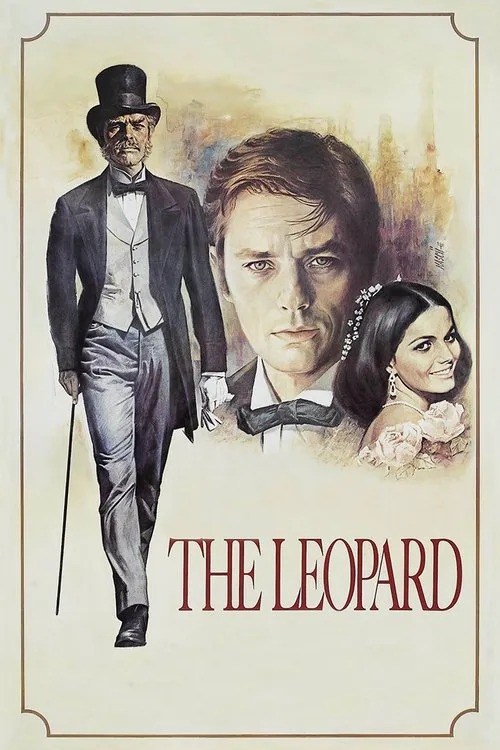The Leopard

Plot
Set against the tumultuous backdrop of Italy's unification, Luchino Visconti's 1963 masterpiece "The Leopard" is a poignant and evocative epic that explores the decline of the aristocracy amidst the seismic changes ushered in by Giuseppe Garibaldi's army. The film is a nuanced and sprawling narrative that deftly excavates the complexities of identity, class, and the inexorable passage of time. The story unfolds on the sun-kissed island of Sicily, where the proud and ancient Salina family presides over a lavish estate, Tomaso, its opulent grandeur a potent symbol of their status and influence. Prince Don Fabrizio Salina, affectionately known as Tancredi's guardian and confidant, is a man of discerning taste and intellect, whose keen understanding of the shifting tides of history impels him to navigate the choppy waters of revolution with caution and pragmatism. When Tancredi, his war-hero nephew, emerges from the battlefields of Garibaldi's campaigns, the prince is faced with a dilemma. The aristocratic traditions that have defined the Salina family for generations are under siege, as the egalitarian ideals of the revolution begin to insinuate themselves into the social fabric of Sicily. To preserve the family's accustomed level of comfort, prestige, and clout, Fabrizio makes the calculated decision to allow Tancredi to marry Angelica, the beautiful daughter of Don Calogero, a bourgeois parvenu who has risen to prominence through his successful mercantile ventures. Angelica's arrival in the Salina household is a turning point in the narrative, marking the point of no return for the embattled aristocracy. Her presence injects a vitality and freshness into the household, which is at odds with the staid and antiquated values of the Salinas. As Tancredi and Angelica's romance blossoms, the boundaries between classes and social strata begin to blur, threatening the very foundations of the Salina family's world. Fabrizio is acutely aware of the perils that attend this transformation, and his ambivalence towards the new order manifests itself in his increasingly isolated and withdrawn demeanor. As the revolution advances, he becomes increasingly disenchanted with the vacuous and materialistic pursuits of the aristocracy, and the empty, ceremonial grandeur of their rituals and rituals. Through his relationships with Tancredi, Angelica, and the enigmatic Lampedusa, Fabrizio is forced to confront his own identity, his values, and the rapidly changing landscape of Sicily. Meanwhile, Garibaldi's troops continue their relentless push towards the unification of Italy, threatening the very existence of the Salina family and their way of life. Tancredi, torn between his loyalty to his family and his duty to the revolution, finds himself increasingly at odds with Fabrizio's stately reserve. As the conflict between loyalty and conviction reaches its boiling point, Tancredi must confront the choice between abandoning his family and sacrificing his own ambitions to the whims of the revolution. Visconti's sumptuous direction brings the world of the Salinas to vivid life, conjuring the opulence, beauty, and decay of their ancestral home. Through the eyes of Fabrizio and Tancredi, the film captures the poignant trajectory of a family's decline, a decline precipitated by the irrevocable passage of time and the unstoppable tide of revolution. Shot on location in Sicily, "The Leopard" boasts some of the most breathtaking cinematography of any film of the 1960s, capturing the languid beauty of the island's landscapes and the intricate textures of its architecture. Visconti's meticulously researched production design and costumes bring the entire period to life, transporting the viewer to a world of opulence, grandeur, and fading aristocratic traditions. Burt Lancaster, in a commanding performance, brings Fabrizio to life as a complex and nuanced figure, torn between his loyalty to his family and his duty to himself. The chemistry between him and Alain Delon, as Tancredi, is undeniable, and their complicated relationship forms the emotional core of the film. Claire Danes, who won the Academy Award for Best Actress in the 1995 American adaptation of the movie, plays the captivating Angelica, injecting a much-needed vitality into the narrative. Through its sweeping and nuanced exploration of identity, class, and tradition, Visconti's masterpiece offers a profound meditation on the passage of time and the inexorable decline of an ancient order. As the Salina family, along with the entire Sicilian aristocracy, is inexorably drawn towards the abyss of obsolescence, "The Leopard" reminds us that even the most entrenched and enduring of social systems must yield to the inevitable tides of change.
Reviews
Recommendations




